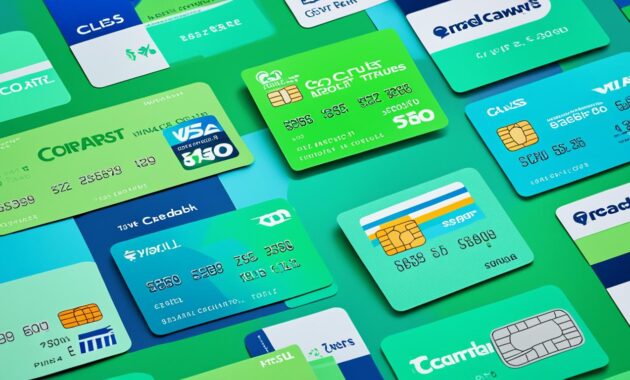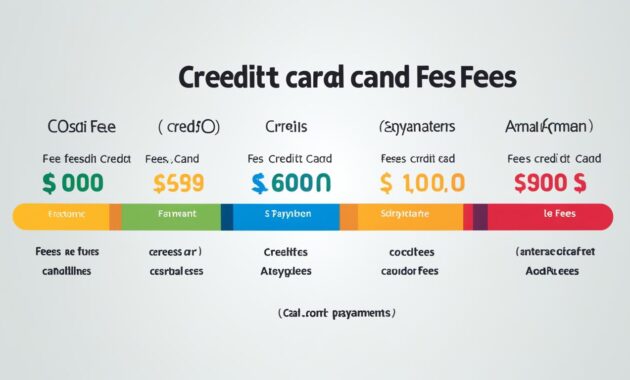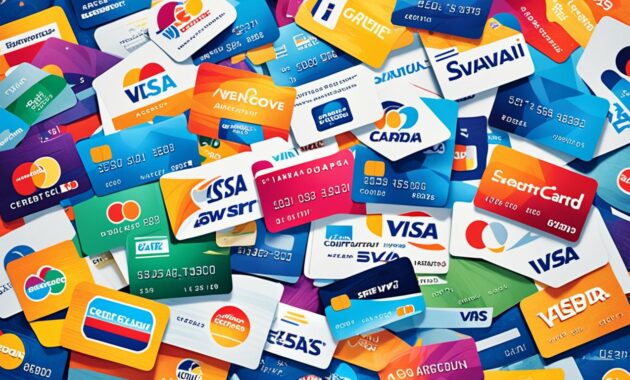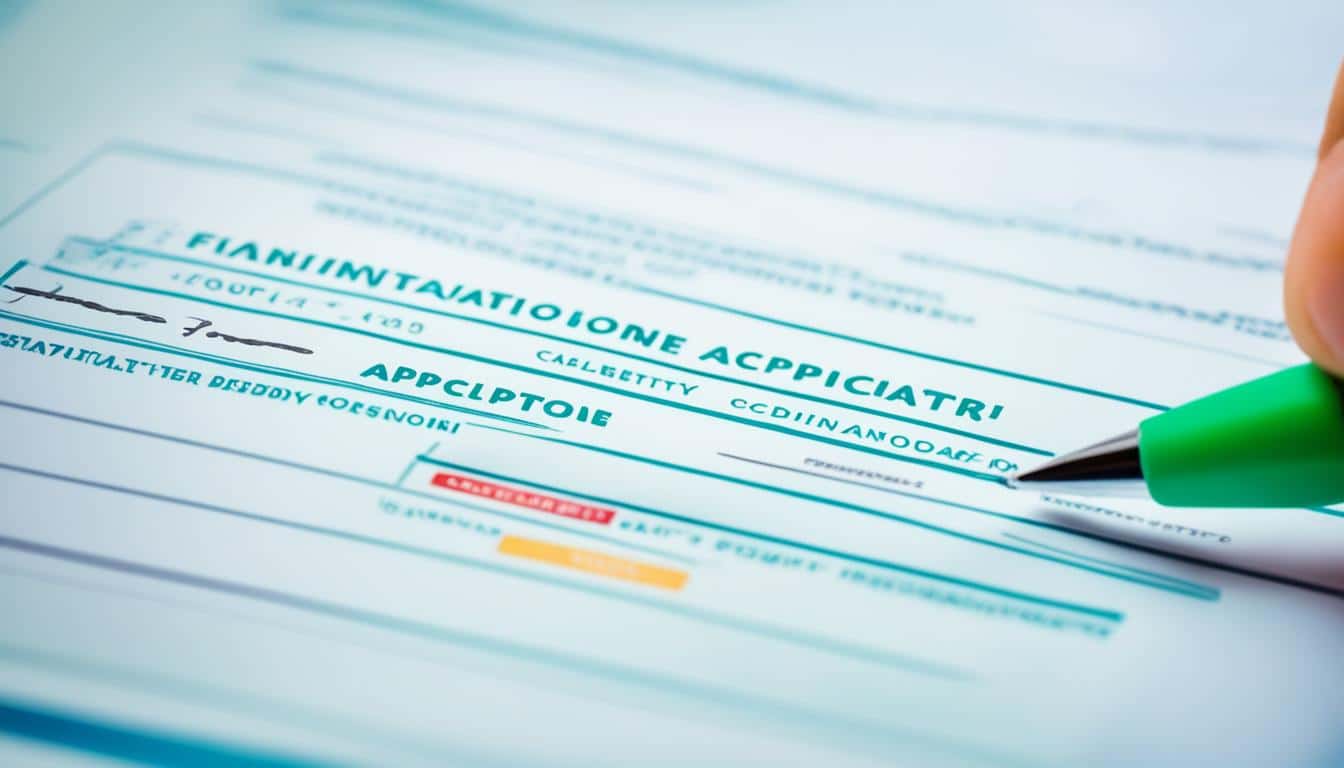Applying for a credit card can be a daunting process, but it doesn’t have to be. By understanding the steps involved and doing some research, you can easily apply for a credit card that suits your needs. Before you begin, it’s important to know your credit score, as this will play a significant role in the approval process. Once you have your credit score in hand, you can start comparing different credit cards and their features, such as APR and rewards programs. Finally, you can complete the credit card application online or in-person, providing all the necessary information required by the card issuer.
Key Takeaways:
- Knowing your credit score is important when applying for a credit card.
- Compare different credit cards based on their APR and rewards programs.
- Complete the credit card application online or in-person.
- Provide all necessary information required by the card issuer.
- Research and understand the terms and conditions before applying.
Know Your Credit Score and Its Importance in the Application Process
Your credit score plays a vital role in the credit card application process. It is a three-digit number that reflects your creditworthiness and helps issuers assess the likelihood of you repaying a loan. Understanding your credit score is crucial as it directly impacts your ability to obtain credit and affects the terms and conditions offered to you.
Having a good credit score increases your chances of credit card approval. Card issuers are more confident in lending to individuals with a proven track record of responsible credit behavior. On the other hand, a poor credit score can lead to a denied credit card application.
When you apply for a credit card, the issuer will review your credit score to assess your creditworthiness and determine the level of risk they’d be taking by approving your application. A higher credit score indicates a lower risk, making you a more attractive candidate for credit.
“A good credit score is an essential aspect of your credit health. It not only impacts your access to credit but also influences the terms and conditions of that credit.”
Checking your credit score is the first step to understanding your creditworthiness. Many credit bureaus provide credit score reports, such as EquiFax, Experian, and TransUnion. You can also use credit monitoring services or check your score with a credit card issuer.
Why does your credit score matter?
Your credit score matters because it affects your financial opportunities. A good credit score can help you:
- Obtain favorable interest rates on loans and credit cards
- Qualify for higher credit limits
- Access better rewards and benefits offered by credit card issuers
- Rent an apartment or secure a mortgage
- Get approved for favorable insurance rates
On the other hand, a poor credit score can result in:
- Higher interest rates
- Lower credit limits or denials for credit applications
- Difficulty securing a rental agreement or mortgage
- Higher insurance premiums
Knowing your credit score gives you an understanding of your creditworthiness and allows you to take the necessary steps to improve it if needed. Building and maintaining a good credit score is crucial for your overall financial health.
Compare Different Credit Cards Based on Your Needs

After assessing your credit score, it’s time to compare different credit cards to find the one that best suits your needs. Consider several essential factors including credit card terms, annual fees, APR, and rewards programs. By carefully evaluating these aspects, you can make an informed decision and choose a credit card that aligns perfectly with your spending habits and financial goals.
To help you in the comparison process, below is a table outlining key features and benefits to consider when evaluating credit cards:
| Feature | Description |
|---|---|
| Annual Fee | The yearly cost associated with having a credit card. |
| APR | The Annual Percentage Rate, representing the interest rate on purchases made with the credit card. |
| Rewards Program | Incentives provided by the credit card issuer for cardholders, such as cash back, travel rewards, or statement credits. |
Using this table as a guide, you can compare credit cards side by side, focusing on the specific features that matter most to you. For example, if you frequently travel, a credit card offering travel rewards might be more beneficial. However, if you prefer cash back on your everyday purchases, a card with a cash back rewards program might be the better choice.
Remember, the aim is to find a credit card that not only aligns with your spending habits but also offers rewards and benefits that are valuable to you. By carefully comparing different credit cards, you can make an informed decision and find the perfect credit card to meet your needs.
Getting Started: Compare Credit Cards in Action
Let’s take a look at an example of how to compare credit cards to find the best fit:
- First, consider your spending habits and financial goals. Are you primarily interested in travel rewards, cash back, or other benefits?
- Next, research credit card offerings from reputable issuers. Visit their websites or consult with financial experts to gather information about the cards they offer.
- Compare the annual fees associated with each credit card. Ensure that the fees are reasonable and justifiable based on the benefits provided.
- Examine the APR for each credit card, taking note of any introductory rates, balance transfer rates, or penalty rates.
- Evaluate the rewards programs available for each credit card option. Look for programs that provide rewards that align with your spending habits and offer redemption options that suit your preferences.
- Consider any additional perks or benefits offered by the credit card, such as extended warranties, travel insurance, or access to exclusive events.
- Review the terms and conditions of each credit card, paying attention to any potential fees or restrictions that may apply.
- Based on your analysis, narrow down your options to two or three credit cards that best meet your needs.
- Finally, make your selection and proceed with the application process for the credit card that stands out as the most suitable choice for you.
By following these steps and carefully comparing credit cards based on your needs, you’ll be well-equipped to make an informed decision and select a credit card that aligns perfectly with your financial goals and preferences.
Understand Credit Card Terms and Fees

Before applying for a credit card, it’s crucial to understand the various terms and fees associated with it. By familiarizing yourself with these key aspects, you can make informed decisions when choosing a credit card that aligns with your financial goals. Let’s take a closer look at some common credit card terms and fees to watch out for:
Credit Card Terms
Annual Fee: This is a yearly fee charged by the credit card issuer for maintaining your account. Annual fees vary depending on the credit card and its features.
APR (Annual Percentage Rate): APR represents the interest rate you’ll pay on your credit card balance. It’s essential to understand the APR, as it can significantly impact the overall cost of borrowing.
Balance Transfer: A balance transfer involves moving the outstanding balance from one credit card to another. Some credit cards offer promotional rates for balance transfers, allowing you to consolidate your debt at a lower interest rate.
Cash Advance: A cash advance allows you to withdraw cash from your credit card. However, keep in mind that cash advances typically carry higher interest rates and may have additional fees.
Fees
Penalty Fees: Credit card issuers may charge penalty fees for late payments or exceeding your credit limit. It’s important to understand these fees to avoid unnecessary charges.
Now that you have a better understanding of credit card terms and fees, you’ll be better equipped to choose a credit card that suits your needs and use it responsibly. It’s crucial to read and understand the terms and conditions of any credit card before applying. By doing so, you can make informed financial decisions and avoid any surprises down the line.
Building or Rebuilding Credit History with a Credit Card

A credit card can be an effective tool for building or rebuilding your credit history. Whether you’re new to credit or have a poor credit score, a secured credit card can provide you with an opportunity to demonstrate responsible credit behavior and improve your credit score over time.
A secured credit card requires a security deposit, which serves as collateral for the credit limit. By using the secured credit card responsibly and making timely payments, you can showcase your ability to manage credit effectively, which is crucial for building a positive credit history.
With responsible use of a secured credit card, you can establish a credit history and gradually improve your credit score. Making regular and on-time payments shows lenders that you are a reliable borrower, increasing your chances of obtaining more favorable credit terms in the future.
It’s important to note that building credit takes time and consistency. By establishing responsible credit habits with a secured credit card, you can lay the foundation for a healthier credit profile.
Benefits of a Secured Credit Card for Building Credit:
- Opportunity to build credit: A secured credit card allows you to start building credit history, even with limited or poor credit.
- Establish creditworthiness: By using a secured credit card responsibly, you can show lenders that you are capable of managing credit responsibly.
- Gradual credit score improvement: Regular payments and responsible credit behavior can help improve your credit score over time.
- Increased chances of approval: Secured credit cards are often more accessible to individuals with limited or poor credit, providing an opportunity to establish credit and work towards better credit terms.
It’s important to remember that responsible credit behavior goes beyond just making payments on time. It also involves maintaining a low credit utilization ratio, keeping track of your credit activity, and avoiding excessive debt. By practicing responsible credit behavior, you can establish a solid credit history and pave the way for better financial opportunities.
Case Study: Maria’s Journey to Building Credit
“When I graduated from college, I had no credit history and struggled to get approved for credit cards and loans. I decided to apply for a secured credit card to help me build credit from scratch.
I made sure to use the card responsibly, keeping my utilization low and making all payments on time. Over time, my credit score started to rise, and I was able to qualify for unsecured credit cards with better terms and rewards. Today, I have a solid credit history and enjoy the benefits of having a good credit score.”
Building or rebuilding credit with a credit card requires patience and discipline. By starting with a secured credit card and demonstrating responsible credit behavior, you can lay the groundwork for a strong credit history and future financial success.
Tips for Improving Your Credit Score

Having a good credit score is crucial for gaining better financial opportunities. It can affect your ability to secure loans, obtain favorable interest rates, and even qualify for certain rental properties. If you’re looking to improve your credit score, here are some helpful tips:
- Pay your bills on time: Your payment history has a significant impact on your credit score. Make it a priority to pay all your bills, including credit card payments, loan installments, and utility bills, on time. Late payments can negatively affect your credit score.
- Reduce credit card balances: High credit card balances can increase your credit utilization ratio, which is the amount of credit you’re using compared to your total available credit. Aim to keep your credit utilization below 30% to improve your credit score.
- Develop good credit habits: Practice responsible credit behavior by managing your credit responsibly. Avoid maxing out your credit cards, only apply for new credit when necessary, and refrain from closing old credit accounts as they contribute to your credit history.
- Check your credit report regularly: Monitoring your credit report allows you to identify any errors or discrepancies that could be impacting your credit score. Dispute inaccuracies and ensure your credit report reflects accurate information.
Follow these tips consistently, and over time, you’ll see improvements in your credit score. Remember, building and maintaining good credit is a long-term commitment that requires responsible financial habits.
Check Your Pre-Approval Offers

Before applying for a credit card, it’s important to explore pre-selected offers for a more informed decision. Many credit card issuers provide pre-approval options, allowing you to see the available credit card offers tailored to your financial profile. The best part is, checking pre-approval offers has no impact on your credit score, making it a risk-free way to explore your options.
To check your pre-approval offers, simply fill out a quick online application. This process takes just a minute and requires you to answer a few simple questions about your credit score, income, and personal information. Once completed, you will receive a list of credit card offers that you are pre-selected for, based on the information provided.
Checking pre-approval offers provides valuable insights into the types of credit cards you may qualify for, allowing you to compare terms, benefits, and features. This helps you make an informed decision that aligns with your financial goals and needs.
Here’s a step-by-step guide to checking your pre-approval offers:
- Visit the website of a trusted credit card issuer.
- Look for the “Pre-Approval” or “Check Your Offers” section.
- Click on the provided link to access the pre-approval application.
- Fill out the required information, including your name, address, income, and social security number.
- Submit your application and wait for the results.
It’s worth noting that pre-approval offers do not guarantee credit card approval, but they serve as a helpful indicator of your eligibility. Once you have explored your pre-approval offers, you can proceed with the credit card application process, armed with a better understanding of the credit cards that suit your financial situation.
The Benefits of Checking Pre-Approval Offers
Here are some key benefits of checking pre-approval offers:
- Save Time: By reviewing pre-approval offers, you can focus your application efforts on credit cards that are more likely to approve your application.
- Compare Options: Pre-approval offers allow you to compare different credit card options, including their rewards programs, fees, and benefits.
- No Impact on Credit Score: Checking pre-approval offers does not affect your credit score, making it a risk-free way to explore your credit card options.
Take advantage of the convenience and insights provided by pre-approval offers to make an informed decision when applying for a credit card.
Manage Your Credit Card Account

Once you have a credit card, it’s crucial to manage your account effectively. By taking the necessary steps to manage your credit card account, you can ensure a positive credit history and avoid unnecessary fees or penalties.
- Activate your card: Upon receiving your credit card, it’s essential to activate it before using it for any transactions. Follow the instructions provided by the card issuer to activate your card securely.
- Enroll in online banking: Sign up for online banking services offered by your credit card issuer. Online banking provides convenience and allows you to access your account information, view transaction history, and manage your card from anywhere at any time.
- Pay your bill on time: Make sure to pay your credit card bill before the due date to avoid late fees and potential negative impacts on your credit history. Set up automatic payments or reminders to ensure timely payments.
- Check your account regularly: Regularly monitor your credit card account for any unauthorized transactions or suspicious activity. Promptly report any discrepancies to your card issuer to mitigate potential fraud.
- Take advantage of online features and benefits: Explore the online features and benefits provided by your credit card issuer. These may include options to set spending limits, track rewards points, receive notifications for account activity, and more.
To provide a visual representation of the value of managing your credit card account effectively, below is a sample table highlighting the benefits and consequences of various account management actions:
| Action | Benefit | Consequence |
|---|---|---|
| Activate card | Gain access to credit card features and benefits | Unable to use the credit card for transactions |
| Enroll in online banking | Convenient access to account information and management | Limited visibility and control over credit card account |
| Pay bill on time | Avoid late fees and maintain a positive credit history | Accrual of late fees and potential negative impact on credit score |
| Check account regularly | Identify and report unauthorized transactions or suspicious activity | Missed detection of potential fraud or unauthorized transactions |
| Take advantage of online features and benefits | Maximize rewards, track spending, and customize account preferences | Underutilization of available features and missed opportunities for savings |
Remember, managing your credit card account responsibly is key to maintaining financial control and establishing a positive credit history. By staying proactive and utilizing online tools and resources, you can make the most of your credit card experience.
Tips for Responsible Credit Card Usage

Responsible credit card usage is crucial for maintaining good credit and overall financial well-being. By following these tips, you can avoid debt, stay within your budget, and make the most of your credit card.
Create a Budget and Stick to It
One of the essential steps in responsible credit card usage is to create a budget. Determine your monthly income and expenses to establish clear spending limits. By tracking your spending and sticking to your budget, you can avoid overspending and accumulating unnecessary credit card debt.
Avoid Carrying a High Balance
Carrying a high balance on your credit card can lead to costly interest charges and potentially put you in debt. To maintain responsible credit card use, strive to pay off your balance in full each month. This way, you can avoid interest fees and keep your credit card utilization ratio low, which positively impacts your credit score.
Pay Your Bill in Full and On Time
To maintain a positive credit history, it’s crucial to pay your credit card bill in full and on time every month. Late payments can lead to penalty fees and negatively impact your credit score. Establish a payment reminder system or set up automatic payments to ensure you never miss a due date.
Monitor Your Spending and Review Transactions
Regularly monitor your credit card spending to stay aware of your financial habits. Review your transactions frequently, either online or through your credit card issuer’s app or website. This practice helps you detect any fraudulent activity promptly and allows you to track your expenses to stay within your budget.
Quotes:
“Responsible credit card usage requires discipline and vigilance. By keeping track of your spending, paying your bill in full, and staying within your budget, you can maintain a healthy credit profile.” – Financial Expert
| Tips for Responsible Credit Card Usage | Explanation |
|---|---|
| Create a budget and stick to it | Creating a budget helps you control your spending and avoid unnecessary debt. |
| Avoid carrying a high balance | Paying off your balance in full each month minimizes interest charges and promotes a low credit utilization ratio. |
| Pay your bill in full and on time | Timely and full payments ensure a positive credit history and help you avoid penalties and fees. |
| Monitor your spending and review transactions | Regularly checking your transactions allows you to detect any fraudulent activity and stay on top of your financial habits. |
By implementing these tips for responsible credit card usage, you can effectively manage your finances and build a strong credit history. Remember to prioritize budgeting, avoid carrying a high balance, pay your bill in full, and monitor your spending to ensure a positive credit card experience.
Also Read : Balance Transfer Tips for Credit Card Savvy
Conclusion
Applying for a credit card is a simple process when you understand the necessary steps and consider essential factors such as your credit score and the terms and fees associated with the card. By comparing different credit cards based on your needs, building or rebuilding your credit history, and practicing responsible credit card usage, you can optimize the benefits of your credit card and enhance your overall financial well-being.
Remember, before diving into the credit card application process, it is crucial to check your credit score and review your credit report. This information will help you choose the right credit card for your needs and increase your chances of approval. Additionally, compare different credit cards, considering their features, benefits, and the reputation of the card issuers.
Once you have a credit card, managing your account effectively is key. Take advantage of online banking services to activate your card, pay your bills on time, and regularly check your account for any unauthorized transactions. By practicing responsible credit card use, such as staying within your budget, avoiding debt, and paying your balance in full, you can nurture a positive credit history and maintain control of your finances.
Remember, your credit score plays a crucial role in the credit card application process. Improving your credit score by adopting healthy credit habits, monitoring your spending, and promptly addressing any errors on your credit report can significantly boost your chances of approval and open doors to better financial opportunities.
Apply for a Credit Card Now
Ready to take the next step? Apply for a credit card today and seize the benefits it offers. Start by checking pre-approval offers to assess your eligibility and compare various credit cards that match your needs and preferences.
Use our online application platform to conveniently provide all the necessary information required by the card issuers. Be sure to carefully read and understand the terms and conditions before submitting your credit card application.
Unlock the possibilities that credit cards offer and embark on a journey towards financial success!
How to Get Started Today
Now that you have a better understanding of how to apply for a credit card, it’s time to take the next steps. Begin by checking your credit score and reviewing your credit report. This will give you valuable insights into your credit health and help you choose the right credit card for your needs.
Once you have assessed your credit, it’s time to compare different credit cards. Look at their features and benefits, such as rewards programs, APR, and annual fees. Consider the reputation and customer service of the credit card issuer as well. This will help you make an informed decision and find a credit card that aligns with your financial goals.
After comparing credit cards, you can apply for a credit card online. Fill out the necessary information accurately and thoroughly. Make sure to review the offers available to you and select the one that suits you best. Remember to carefully read and understand the terms and conditions before submitting your credit card application.
FAQs
Q: How can I apply for a credit card with intro APR offers?
A: You can apply online for credit cards with intro APR offers by visiting the websites of major credit card issuers like Capital One or Visa.
Q: What is the best way to apply for a credit card to build my credit?
A: To build your credit, it’s best to apply for a credit card specifically designed for individuals looking to establish or improve their credit history.
Q: How can I apply for a card with Capital One if I have excellent credit?
A: If you have excellent credit, you can apply for a Capital One credit card by visiting their website and submitting an online application.
Q: Can I apply for a new credit card without it hurting my credit score?
A: Applying for a new credit card may temporarily lower your credit score due to the hard inquiry on your credit report, but it typically bounces back over time.
Q: What is the process to apply for a business credit card with rewards?
A: To apply for a business credit card with rewards, you can compare offers online and then submit an application through the issuer’s website.
Q: How can I check my credit before applying for a new card?
A: You can check your credit by requesting a copy of your credit report from the three major credit bureaus before applying for a new credit card.
Q: Where can I find the best credit card offers and apply online?
A: You can find the best credit card offers and apply online by visiting the official websites of credit card issuers or reputable financial comparison platforms.
Source Links
- https://www.bankofamerica.com/credit-cards/
- https://www.bankrate.com/finance/credit-cards/how-to-apply-for-a-credit-card/
- https://usa.visa.com/pay-with-visa/find-card/apply-credit-card
